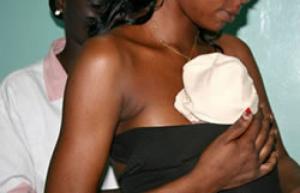Senegal: A leap forward on infant survival
In Senegal, midwives are helping new mothers of premature or low-birth-weight babies improve their children’s chance for survival and healthy development. The answer lies in teaching them to emulate one the world’s most beloved animals.
The tiny baby girl, who weighed less than 2kg when she was born at the Gaspard Kamara Health Centre in Dakar 2 weeks ago, is being gently placed on her mother’s bare chest and then bound there with a piece of fabric. She is dressed only in a diaper, a warm hat and socks, but soon she will be perfectly snug and warm, skin to skin with her mother, Madame Khady, and able to suckle at will – very much like a kangaroo baby. The comparison is so apt that this simple approach to the care of premature and low-birth-weight babies is called kangaroo mother care.
Kangaroo mother care
This low-cost, low-tech intervention has been shown to reduce the risk of death by 40% and of illness by almost 60% in low-birth-weight and premature babies, who are vulnerable to hypothermia and potentially deadly infections like pneumonia. At the Gaspard Kamara Health Centre, a team of midwives is using WHO-developed training materials to show new mothers like Mme Khady how to use kangaroo mother care and give their small babies a better chance of survival.
|
“WHO guidelines... help improve the skills of our staff and to establish globally recognized recommendations so that we can provide the best possible care to newborn babies,” Dr Ndiaye Ndome, district chief medical officer at the Gaspard Kamara Health Centre. |
“WHO guidelines are an important tool for us, to help improve the skills of our staff and to establish globally recognized recommendations so that we can provide the best possible care to newborn babies,” says Dr Ndiaye Ndome, district chief medical officer at the Gaspard Kamara Health Centre.
The stakes for the programme’s success are high. Every year in Senegal, more than 4000 babies die as a result of prematurity. At this health centre in suburban Dakar, more than a third of the newborn babies who die are of low birth weight, either because they were born premature or grew too slowly during pregnancy. Many of these babies’ lives can be saved with inexpensive care that includes warmth, exclusive breastfeeding and protection from infection.
Today Madame Khady has learned how to secure her baby into the “kangaroo” position by herself and how to recognize signs of infection, such as fever, so that she knows when she should take her baby to the doctor.
Training in community-based newborn care
WHO provided technical and financial support for the introduction of a package of community-based newborn care, of which kangaroo care is a part. So far, with funding from UNICEF, 116 health workers have been trained in 22 health centres and 7 hospitals, but the long-term plan is to introduce kangaroo care to around 1000 health centres across the entire country.
Dr Fatim Tall, reproductive health advisor in WHO’s Senegal office, emphasizes that the Ministry of Health recognizes kangaroo mother care as an important component of efforts to save newborn lives and lists it as a priority intervention in the country’s national plan for child survival for 2013-2015.
Senegal has made steady progress in reducing newborn deaths. In 1990, 41 out of 1000 babies did not survive the first month of life. In 2012, that number had been reduced by nearly a half, to 24 (out of 1000 live births). The kangaroo mother care programme is at such an early stage that it is too soon to demonstrate impact on preventing infant deaths in this country.
However, evidence from other low-resource settings worldwide supports its use as a safe and effective alternative to conventional incubator care. “Not only does kangaroo mother care reduce severe illness in small babies, it improves bonding and empowers mothers to feel more competent in caring for their new baby,” says Dr Severin von Xylander, from WHO’s Department of Maternal, Newborn, Child and Adolescent Health. “Widely used in Scandinavian countries and the United Kingdom, kangaroo mother care is not for just low-resource settings. Almost three decades of use have proven that it is effective in caring for low-birth-weight babies in all settings.”



